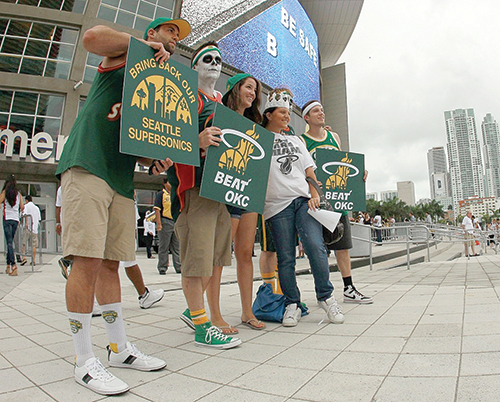For all the 11th-hour scrambling for an investor-savior by the city of Sacramento, it is a near-inevitability that the Kings will soon be relocating to Seattle and reviving the SuperSonics franchise. Fans in California’s capital now know the pain that residents of the Emerald City understand all too well—no matter how much supporters might stand behind their local team, fan loyalty is nothing when profit is paramount.
Basement Notes: Sacramento and the Sonics

For all the 11th-hour scrambling for an investor-savior by the city of Sacramento, it is a near-inevitability that the Kings will soon be relocating to Seattle and reviving the SuperSonics franchise. Fans in California’s capital now know the pain that residents of the Emerald City understand all too well—no matter how much supporters might stand behind their local team, fan loyalty is nothing when profit is paramount.
The joy among the Sonics faithful will perhaps be tempered by the realization that they have been on the opposite side of this ledger before. Five years ago, the original Seattle franchise was wrested from the city when an ownership group led by Clay Bennett bought the team and relocated it to Oklahoma City. It appears that Seattle will be the beneficiaries this time, as the Maloof brothers shop around the Kings in hopes of recovering some of their reeling fortune.
Make no mistake, this move is all about the money. The Maloofs are set to gain $340 million from the sale of their team to the group of investors led by Chris Hansen and Steve Ballmer. With their real estate holdings and Las Vegas empire plummeting in value over the past few years, the Sacramento Kings have become little more than a safe-deposit box holding the brothers’ last valuable assets.
We as fans enjoy harboring the illusion that our favorite teams are staples of the communities in which they play. The reality, however, is that franchises have changed locations at will throughout the history of the NBA and other professional sports leagues, and Sacramento was no more capable of avoiding this reality than any other floundering franchise.
The Kings started out in Rochester, N.Y. in 1945, back when they were known as the Royals. They spent their first 12 years there before moving on to Cincinnati, where they survived for another 15 years before packing up again and heading to Kansas City. Now known as the Kings, the team split games between Kansas City and Omaha for its first three seasons after moving from Ohio, but settled into the Kemper Arena in Kansas City full-time in 1975. The marriage didn’t last long, however. As in their previous stops, attendance began to drop after the team’s honeymoon period. Unable to remain profitable in Kansas City, the moving vans appeared once more and the organization traveled west to Sacramento for the 1985-86 season.
Even franchises with a history of success are not immune to the threat of relocation. It happened to the Minneapolis Lakers, who went to Los Angeles in 1960 despite winning five titles in 12 years. The Baltimore Colts took their four NFL championship banners to Indianapolis in 1984 after falling on hard times over the previous decade. Walter O’Malley transferred the Brooklyn Dodgers out to the Pacific coast in 1958 despite playing in four World Series in their previous six seasons. And the Minnesota North Stars were shipped out to Dallas in 1993 just two years removed from a Stanley Cup appearance against Pittsburgh. Though a move may be made in the best long-term interests of a league, relocations reinforce the reality that no fan can ever feel completely secure about the future of their team.
So enjoy the revival of the SuperSonics, Seattle, but don’t let the excitement of the return dull your empathy for the city whose team is being moved. As history has shown time and time again, relocation is always just a splash of red ink away.







